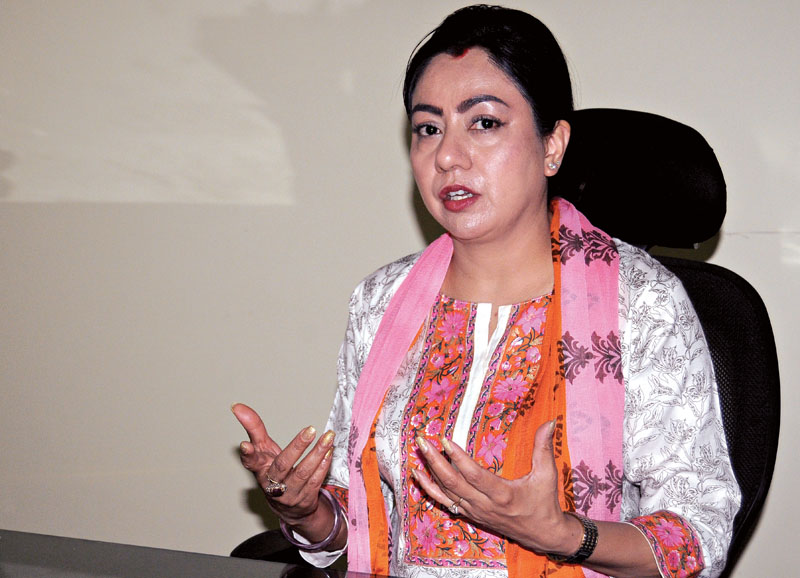‘Private sector expects budget to promote country’s production sector’
The government is bringing the annual budget for fiscal year 2017-18 on Monday as per the constitutional provision, which states that the annual budget needs to be tabled in the Parliament on May 29 every fiscal year. However, the government recently informed that it will not introduce any new programmes in the budget as this would breach the election code of conduct set by the Election Commission of Nepal that was introduced targeting the local elections. Meanwhile, different bodies representing the private sector of the country had already submitted their suggestions to the government which they wanted the government to incorporate in the new budget. In this context, Sujan Dhungana of The Himalayan Times spoke to the heads of three private sector bodies — Federation of Nepalese Chambers of Commerce and Industry, Confederation of Nepalese Industries and Nepal Chamber of Commerce — to know more about the expectations of the private sector in the budget. Excerpts:
‘Private sector expects budget to promote country’s production sector’
— Bhawani Rana, President, FNCCI
The government is unveiling the annual budget for fiscal year 2017-18 on Monday. What issues do you think should the budget address?
It is good that the government is bringing the fiscal budget within the timeframe mandated by the constitution of the country. Like in previous years, FNCCI has suggested the government to incorporate issues related to infrastructure development, tourism promotion, agriculture commercialisation and improved tax administration in the upcoming budget. The private sector expects the budget to promote country’s production sector as investors are increasingly shifting to trading sector in recent years due to lack of investment-friendly environment in Nepal. We cannot achieve substantial economic growth unless production is focused on and export sector is encouraged. Once production sector gets government priority, it will create numerous job opportunities in the country, which is one of the major problems of Nepal. Similarly, the budget should also promote infrastructural development of the country. Nepal today has very poor infrastructure and it needs to be standardised to achieve different development goals. Likewise, the government should introduce programmes to explore tourism potential of the country. However, the budget should not merely introduce popular programmes whose implementation is quite challenging.
The government has already informed that it will not introduce any new programmes in the budget this year. What impact will this decision have on the national economy?
Implementation of programmes and policies has always been the bottleneck for development in Nepal. Governments often introduce popular programmes through the budget but always fail to implement them properly. I believe that the government should now focus on implementing existing programmes and projects. As the government will not introduce new programmes in the budget for 2017-18, it should focus more on implementation of all the ongoing projects and programmes. Strict implementation of ongoing projects and their timely completion will have a positive
effect on the national economy. Moreover, strict implementation of programmes and projects will increase capital expenditure of the government, which has remained a major setback to Nepal’s economy.
You mentioned about the need to reform tax administration. What type of reform are you specifically talking about?
The taxation system in Nepal is problematic in different ways. There are a number of occasions when the government has been imposing more duty on imported raw materials than finished products. High taxes on raw materials will directly increase production cost of Nepali goods and make it difficult for those products to compete in the international markets. Similarly, the government has not yet implemented the one-window system to pay taxes and complete different other administrative works of businesses. Moreover, different tax related policies of the government are contradictory and conflicting. These things should be addressed in the budget.
‘Govt should separate one-third of the budget for infrastructure’
— Hari Bhakta Sharma, President, CNI
The government is about to introduce the annual budget. What would you like to see included in the forthcoming budget?
The private sector is always happy when the government brings the annual budget on time. However, we have less expectations from the budget for the new fiscal year as the government has already announced that it will not incorporate any new programmes and policies. The government earlier had sought recommendations from the private sector and had vowed to incorporate them in the new budget. However, all our suggestions now mean nothing as the budget is only giving continuity to the previous programmes. With the country institutionalising the federal system and different elections in the offing, the new budget should be ambitious and cater to the demand of all local units. The budget should encourage maximum use of local resources and focus on resource mobilisation. Similarly, there is a trend whereby the government always increases taxes on different products and services in every annual budget. This trend has to be stopped as an increase in taxes will lead to a rise in the prices of different products. This will demotivate domestic traders and will leave a negative impact on the overall trade of the country.
What are the issues you feel that the annual budget should address to boost the country’s trade sector?
The government always talks about boosting trade but does nothing substantial to enhance the trade sector in the real sense. Our cost of production is higher because of which Nepali products are losing competitiveness in the global market. Thus, the government should first make efforts to reduce the cost of production of domestic products if it wants to boost the country’s trade. The budget should introduce different export promotion programmes. Similarly, exports have to be incentivised and tax rates have to be brought down. The government should also ensure a business friendly environment to draw foreign investment. Different policies and laws related to the country’s trade and economy have to be reformed and made contextual.






